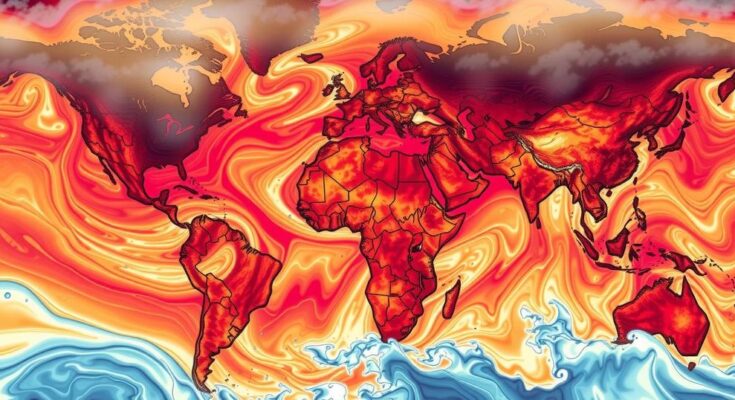Forecasts indicate that 2024 will be the hottest year on record, likely exceeding the 1.5-degree Celsius threshold set by the Paris Agreement. Rapidly rising temperatures, attributed to both human-induced greenhouse gases and the natural influence of El Niño, have led to unprecedented heatwaves and extreme weather events. Despite advancements in understanding underlying causes, uncertainties remain regarding the factors driving this acceleration in global warming.
The year 2024 is poised to be the hottest on record, with predictions indicating that it may be the first to surpass the 1.5-degree Celsius threshold established by the Paris Agreement. This alarming situation arises amidst a backdrop of unprecedented heatwaves, with record temperatures being documented, such as on July 21 and 22, 2024. Climate change has significantly amplified these temperatures, making extreme weather events, like Typhoon Gaemi and Hurricanes Helene and Milton, more devastating. Despite ongoing discussions among scientists, the rapid acceleration in rising temperatures continues to bewilder researchers, who are endeavoring to identify the factors driving this change.
While the emergence of El Niño has contributed to the anomalously high temperatures in 2024, it is insufficient alone to elucidate the recent temperature surge. This phenomenon, termed the ‘anti-hiatus’ by some experts, raises questions reminiscent of the earlier debates concerning a perceived slowdown in global temperature increase from 1998 to 2013. However, unlike that period, scientists currently possess a deeper understanding of contributing factors, even amid unclear nuances of their impact.
Recent findings suggest that the average global temperature in 2023 hit 1.48 degrees Celsius above preindustrial levels, a figure exacerbated by greenhouse gas emissions and the El Niño phase. Notably, the reduction in sulfur aerosols has played a critical role, resulting in warmer conditions as these particles, which historically mitigated heat, have significantly diminished. Furthermore, a decrease in low-lying cloud cover has been observed, a development that enhances solar radiation absorption by the Earth’s surface, thereby intensifying warming.
In conclusion, the record temperatures in 2024 and the potential breach of the 1.5-degree Celsius threshold present a significant challenge to global climate targets. While historical patterns inform current understanding, uncertainties persist regarding the persistent trends of rising temperatures and their implications for future climate stability. It is crucial for scientists and policymakers to continue monitoring and addressing the contributing factors to effectively combat climate change.
The impending record-setting temperatures of 2024 amidst climate change underscore an ongoing global crisis. Scientific models and historical climate data have consistently indicated a warming trend, exacerbated by human activities and natural climatic phenomena such as El Niño, which temporarily intensify global temperatures. The Paris Agreement’s target of limiting global warming to 1.5 degrees Celsius has become increasingly jeopardized as alarming new data emerges, prompting urgent calls for more comprehensive climate strategies and international cooperation to mitigate further warming and its catastrophic effects.
In summary, the year 2024 marks a pivotal moment in the ongoing climate crisis, with temperature records foretelling potentially dire implications for global efforts to combat climate change. The convergence of El Niño and declining sulfur aerosol effects highlight the complexity of climatic interactions that propel an increase in global temperatures, warranting immediate scientific scrutiny and strategic policy interventions. Achieving and maintaining the Paris Agreement’s temperature goals will require concerted global efforts and greater understanding of the interplay between various climatic factors.
Original Source: www.bnnbloomberg.ca




